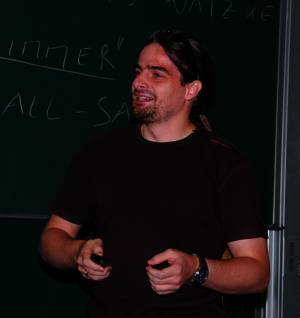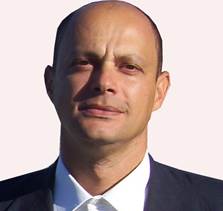Peter Zijlstra
Intel

An update on Real-Time scheduling on Linux
The open problems raised in the keynote can be found in the WATERS forum, which provides for discussion as well.
Abstract:
This talk will outline the current state of Real-Time scheduling supported by the Linux kernel, esp. focussing on the SCHED_DEADLINE scheduling class, which provides a (G)-EDF + CBS based scheduler. It will further highlight current short comings and proposed ways of addressing them; like the situation around Priority Inheritance and its ramifications. We will conclude with some points for future work and research; including issues like Multiple Criticality scheduling, which would be required for a frequently requested feature and issues surrounding Access Control.
Bio:
Peter Zijlstra is co-maintainer of various Linux kernel subsystems including: the scheduler, locking primitives and performance monitoring. He is currently employed by Intel where he assists in enabling new hardware features on Linux.
Giulio Corradi
Xilinx

Tools, Architectures and Trends on Industrial all Programmable Heterogeneous MPSoC
Abstract:
Future industrial systems will be built around multicore processors, system on chip and hardware programmable heterogeneous architectures. Requirements for future embedded systems will ask multifunction, safety-certifiable and capabilities to retain the deterministic nature of such industrial compute and control products. The complexity scale is such that patchwork scattered approaches used in the past to design embedded control are not viable anymore, and only well engineered scalable platforms can match the industry demand. IIOT (Industrial Internet Of Things) and Industry 4.0 requirements are pushing to expand diagnostic and communication capabilities of such platforms, incorporating new communication busses like TSN (Time Sensitive Networks) and calling for on-field safe deployment of software into remote targets. Updating embedded systems remotely rise requirements for security that in turn, affect safety and may impact determinism and real time. Hypervisors and containers aim to solve the safety and security but introduce challenges in determinism and safety certification. This keynote will explore the architectures benefits and tradeoff to afford the challenges of consolidation on the factory floor.
Bio:
Dr. Giulio Corradi is ISM (Industrial Scientific Medical) Sr. System Architect in Munich, Germany. He brings 25 year of experience of management, software engineering and development of ASICs and FPGA in industrial, automation and medical systems specifically in the field of control and communication for the major corporations. DSP algorithms, applied chromatography, motor control, real-time communication, and functional safety have been his major focus. In the years 1997 – 2005 he managed several Research European Funded projects for train communication networking and wireless remote diagnostic systems. Between2000-2005 he headed the IEC61375 conformance test standard. In 2006 Giulio joined Xilinx Munich office leading the Industrial Safety, Industrial Networking and Power Systems Control Xilinx platforms. In his spare time he practices swimming and playing piano.
